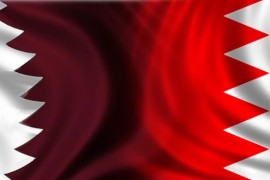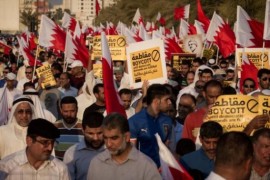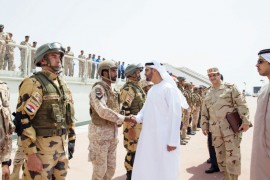It is now obvious that the Bahrain opposition is categorized by Gulf, Arab and international levels as being dependent on Iran. we should stop at this carefully especially that in my opinion, two things may seem contradictory when analyzing the attitude of the Shiite opposition’s public opinion from Iran:
- A common person, not necessarily a person related to intelligence or politics, will not require a lot of effort to discover that the majority of the opposition in Bahrain sympathizes with Iran. Moreover, if a person observes Twitter accounts that are affiliated with the opposition or takes a quick visit to a Shiite village, or to the capital Manama,it will be clearly concluded that the Shiite public opinion sympathize with Iran, Hezbollah, the Shiite groups ruling Iraq, the Houthies, and perhaps with the Syrian regime as well.
Without doubt there are multiple reasons: historical, current, internal and regional, that we have to examine carefully, without forgetting that the public previously chose Bahrain’s independence from Iran, when popular elites were questioned by the United Nations delegate in 1970 on whether they aspire an independent Arab state, or an island subordinate to the rule of Iran.
The shift in the Shiite public opinion towards Iran has a lot of reasons, and perhaps the bulk of these are due to the hostile policies adopted by the regime against the popular majority over the past decades.
- The public opposition still does not accept an Iranian intervention in the internal Bahrain The reasons are understandable at times and incomprehensible at others, especially in light of the congregation of Gulf, Arab, and Western countries against the opposition’s legitimate aspirations for justice and equality, and with the regime’s continuation in rapid naturalization processes to the extent that the time factor became a pressure on the worried Shiite majority from fear of economic and political marginalization in their role in the country.
I suspect that the reasons why the Shiites, generally, adopt a negative attitude towards any Iranian interference is their national sense of independence, their sense of belonging to the Arab world, the concern that this interference would lead to a complexity in the Bahraini case, as well as vulnerability to the hostility displayed on a national, Gulf, Arab and Western levels regarding Tehran and its approach.
Perhaps this reveals the ideality and superficiality of the Shiite public opinion in a complex world where regional and international dimensions interfere with local issues.
Those contradictory points (sympathy with Iran and the refusal of its intervention in the Bahraini affair) is clearly evident among the public opinion of Shiites. On the other hand, loyalists do not conceal their public opinion when they welcomed the military intervention from Saudi Arabia, the Gulf, Jordan, and the West, and they do not have any reservation regarding the naturalization processes. Reasons for such opinions should be analyzed especially that the official oration warns that a democratic transition in Bahrain will automatically mean a Shiite rule and an oppression towards Sunnis.
In light of this, how does the Bahraini opposition, with its pillar being represented by the Shiite Al-Wefaq Society, act?
To begin with, this opposition is in between the contradictions stated above. It is on the one hand sympathetic with Iran’s approach, but wary of any Iranian interference in the country’s problem, which is becoming increasingly complex.
Needless to say that this opposition does not implement foreign agenda. The Bassiouni report revealed that the Bahraini issue is exclusively local, and it is the result of historical grievances ensued on the majority population in the country.
Indeed, the Iranians, as well as others, were surprised by what happened in Bahrain in 2011, and maybe if you asked them, they would say: It is better for Shiite groups in various Gulf and Arab countries to continue dealing with the existing regimes, and not deviate their efforts towards the biggest confrontation with the Zionist enemy, as they phrase it.
In fact, the Bahraini opposition is facing a big dilemma that is not easily approachable. It is in fact in front of the following facts:
- The Gulf military support to the ruling family is In addition to the ground forces of the Saudi Royal Guard and the forces of the UAE police that reside in Bahrain under the name of the Peninsula Shield Forces, Bahrain ports will also be the headquarters of the Gulf naval forces, which the Gulf Cooperation Council announced its formation at the last summit that took place in Doha recently. While the Peninsula Shield Forces have taken a permanent base on the island that is densely occupied by foreign military forces, the Jordanian gendarme, an expert in dealing with the protest movements, is also present as an obvious from of the official Arab support for the violent approach by the Al-Khalifa family in dealing with the demands for change in Bahrain.
- The Western support for the ruling authorities is increasing, and an example is the creation of the British naval base. The cost of this base will be paid by the general budget of Bahrain. Furthermore, the establishment of the base comes as new evidence that the West still seeAl-Khalifa as important allies and must defend their rule, taking into account, of course, the Gulf Western alliance and the equation of oil for security,associating the two sides.
These facts clearly demonstrate to the opposition that the internal dimension is unable to resolve the conflict. While the West, and Arabs from the Gulf as well as the those from the East and West pay to install the status quo and the unilateral governance, the opposition still ask themselves: Is the resort to Iran a right option to achieve the currently lost balance? And to what extent can Iran play a practical role to benefit the opposition, under the crippling economic blockade against Tehran and the wars it is waging in Syria and Iraq? What will be the regional and Western reaction to an attempt of this kind? Will the leftists understand such convergence with Iran?
I will leave the answers to these questions for a later stage, but I will point out that the opposition believes that:
- 1. The mutual understanding regarding the Iranian nuclear program, Tehran’s rapprochement with the West, and the regional expansion of Iran is in the opposition’s. Bahrain is still a Western protectorate, and that the solution to its issues lies in Washington.However, given the fact that the US and the West are widespread in their views, this still does not allow for opportunities of change in Bahrain. This leads us to question the opposition: What should be done? Is it time for a more effective Iranian intervention in Bahrain, even with it being a Western protectorate?




